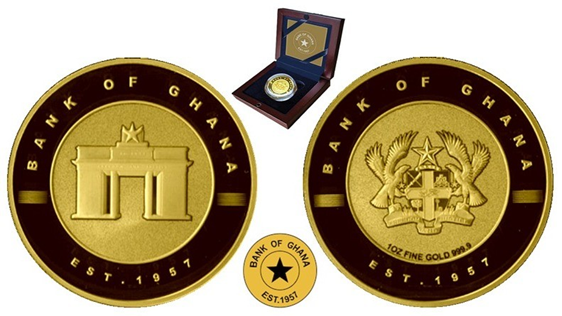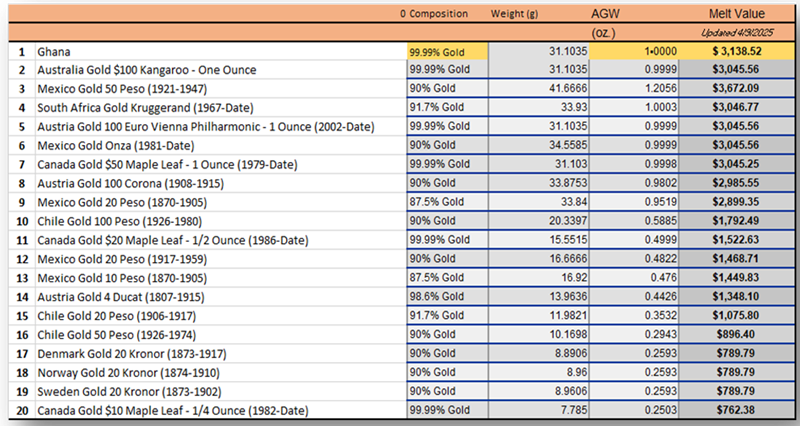Ghana gold coin: A hedge against inflation
Tom Lamptey
Kumasi, Ghana
April 18, 2025
T he Bank of Ghana (BoG) launched a gold coin in September 2024 in Accra Ghana. In a solemn introductory speech, the governor of the central bank described it as ‟a financial asset” and ‟an additional avenue to invest” for Ghanaians. The coins are available in three classes, each with a different weight (1.00 oz, 0.50 oz and 0.25 oz) and price. Investors purchase the coins through their local commercial banks and pay in the national currency, the Cedi. The coins, which refined to 99.99 percent purity, come from gold mined in Ghana.
New Bank of Ghana Gold Coin

Photo ©: Bank of Ghana
What are gold coins?
Gold coins have two related but distinct forms. The first is the ‟bullion coins”, which have a high content of refined gold. The issuing government (or government entity) guarantees and manufactures the coins. Worldwide, nations mint and sell bullion coins. Popular types of bullion coins include: American Gold Buffalo or Gold Eagle and South African Gold Krugerrand. Other prominent bullion coins are the Austrian Philharmonic and the Canadian Maple Leaf.
The second type is the ‟numismatic coins”, which are collector’s items. These coins carry high value compared to bullion coins. Numismatic coin derives their value from the amount of gold they contain, their rarity, condition, and age.
Gold has two major economic characteristics: limited supply and scarcity. Gold does not alter in shape or appearance. Apart from personal items, gold has a wide industrial application. The metal is malleable and a single once produces 27.8 square meters of sheet, which architects use to coat building interior, furniture, and other home items. Gold never corrodes, making it a powerful electricity conductor, especially in electronics applications. In medicine, gold nanoparticles have potential application in cancer treatment and dental care.
Non-systemic and systemic risks
Despite its qualities, gold carries inherent non-systemic risks for investors. Coins are cumbersome and require safe storage for security reasons, which means extra costs for transportation, electronic surveillance, and security tags. Gold coins do not generate income like real estate rental, interest from cash deposit or bond yields. The only way to generate extra income from gold is when its is its relative price increases over time. In addition, investors who sell their coin holdings for more than they paid for it will pay capital gains tax in some countries. Finally, this asset class is not immune from the tumult of global capital markets.
In fact, as an investment option, gold coins also carry systemic downsides. Despite a perception as a liquid asset and a safe-haven, the metal is a conduit for extreme volatility in times of crisis. Market data suggest that gold prices have a positive correlation with inflation and also with major currencies (example, USD, EURO and Swiss Franc).
To determine the value of a gold coin, investors multiply the pure gold content by the current spot price of gold. This valuation will reflect its fair-value, especially for investors who are in mature capital markets. However, West African gold producers do not feel the impact of this valuation. This is because Mali, Burkina Faso, Niger, Côte d’Ivoire and Ghana have little or no influence on spot price. These countries are price takers because they depend on price movements outside of their borders, in mature markets like London (UK), Chicago (USA) and Zürich (Swizerland).
The purchase value of Ghana gold coins have risen since its launch on November 26th, 2024. At the onset, investors paid US$2,893.35 (GH₵45,020.48) in November 2025. By April 4th 2025, the same coin was selling at US$3,226.53(GH₵50,204.84), an appreciation of the selling price of around 10.4 percent. Analysts attribute this performance to the increase in gold price in global capital markets and to exchange rate movements. Sales operations, however, require the deduction of storage fees, initial purchase price, sale transactions cost, taxes, and potential BoG discounts.
Gold coin prices

Photo ©: Bank of Ghana
Pricing, buying, selling and currency risks
Ghanaian coins are among the world’s priciest. The London Bullion Marketing Association (LBMA) Auction afternoon price (PM), especially the previous day’s price, provides the basis for the pricing. For the this pricing the Bank of Ghana then applies the USD vs Ghana Cedi exchange rate from Bloomberg Mid-Rate.
Gold Coins are the priciest in the world

Source: Bank of Ghana and data from ngccoin.com
Domestic commercial banks will be the main channel for the buying and selling of the coins to the public. These Commercial banks must open a gold account with BoG to buy coins on behalf of their customers. The BoG will not sell to or buy gold coins from the public, but in extreme cases, it will buy them back at a potential discount price.
Anti-Money Laundering and Countering the Financing of Terrorism (AML/CFT)
The BoG does not impose any limit or quantity on purchase but says that unusual transactions will trigger additional scrutiny if they exceed customer's average purchase history. The checks are a part of preventive measures against money laundering and terrorism finance. Other risk management measures include mandatory identity verification, transaction reporting, and strict compliance with existing banking regulations. The BoG expects commercial banks to implement robust AML/CFT checks, including monitoring for any red flags that suggest suspicious activities.
Related Articles
